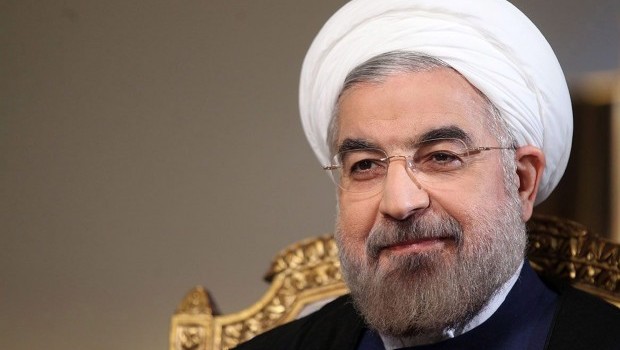
A handout picture made available by the Iranian president’s official website on September 10, 2013, shows Hassan Rouhani speaking in a live broadcast interview in Tehran, Iran. (EPA/IRANIAN PRESIDENTIAL WEBSITE/HANDOUT)
Before leaving Tehran, Rouhani told reporters that “the stances of the Islamic Republic of Iran on key international and regional issues will be explained,” according to reports on Iran’s Press TV.
The summit is Rouhani’s first foreign trip since taking office on August 4. It also highlights Iran’s strategic ties with Russia and China, two permanent members of the UN Security Council, with whom Iran has cultivated close ties.
During the previous administration of Mahmoud Ahmadinejad, Iran adopted a foreign policy dubbed “look to the east,” giving priority to Chinese and other Asian companies for commercial and economic cooperation. The “look to the east” approach also included strategic and nuclear cooperation with Russia.
For both Russia and China, Western attempts to isolate Iran have proved to be very beneficial in terms of offering them near-exclusive access to Iranian markets.
Immediately after arrival, Rouhani met with his Chinese counterpart, Xi Jinping, to discuss international and regional issues, in particular the ongoing Syrian crisis.
Reports indicate that Rouhani and Xi also discussed bilateral relations and the economic links between the two states.
In the meeting, President Rouhani said “Iran–China ties have always been based on friendship, and are growing,” according to his office’s official website.
On the Syrian crisis, the Iranian president told his Chinese counterpart that “Iran and China have common stances in most of the regional and international issues,” adding, “Tehran is ready to cooperate with Beijing to help resolve regional issues, the Syrian crisis in particular.”
According to President Rouhani’s official website, Xi invited Rouhani to visit Beijing in the future.
President Rouhani is also scheduled to meet with Russian president Vladimir Putin on the sidelines of the Bishkek summit to discuss Syria and Iran’s nuclear program. Some reports are also suggesting that the two will discuss the delivery of an advanced anti-aircraft defense system, the S-300, to boost Iran’s military power.
Both Russia and China have publicly supported Iran’s right to peaceful nuclear technology, while reports suggest Putin will offer to build another nuclear plant for Iran during the meeting of the two presidents.
In regards to the Syrian crisis, Iran has taken a similar line to that of both Russia and China, advocating diplomatic negotiations, leading advocates of military action against the Syrian government to warn that this a tactic to buy more time for the Assad to respond.
Rouhani’s next trip is to New York will be to attend the annual UN General Assembly, during which he is expected to launch a new round of negotiations over Iran’s nuclear program with the five permanent members of the UN Security Council and Germany, a group known as the P5+1.
In a parallel development, Ayatollah Khamenei has appointed Admiral Ali Shamkhani as one of his two representatives to Iran’s Supreme National Security Council (SNSC). Significantly, this comes only two days after Shamkani’s appointment as secretary of the council by Rouhani.
Iran’s nuclear negotiations were until recently was handled by the SCNS, but have now been transferred to Iran’s foreign ministry under pragmatist foreign minister Mohamamd Javad Zarif.
Saeed Jalili, Khamenei’s former representative to the SNSC, now serves on the Expediency Council, which is chaired by the moderate former president Hashemi Rafsanjani.
Jalili’s removal from the SNSC and his new role under Rafsanjani has been interpreted as a blow to Iran’s radical conservative faction and a sign of Rouhani’s influence within the various councils and assemblies that play key roles in Iran’s political system.
